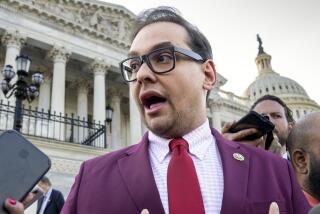Hart Nearly Certain to Get $1 Million in Matching Funds
- Share via
WASHINGTON — Getting back into the presidential race may not win Gary Hart the White House, but it almost certainly will win him $1 million or more in federal matching funds.
That money, in turn, will make Hart’s revived campaign financially far healthier than those of many of his rivals for the Democratic nomination. At the same time, however, the federal checks will create a dilemma for him: Should he use the funds to pay off his 1984 campaign debts--still close to $1.3 million--or should he take the money and run?
Even before disclosure of his involvement with actress Donna Rice raised the “womanizing issue” that drove Hart from the race in May, stories about his old campaign debts had dogged Hart and raised questions about his character. With his re-entry into the race and expected receipt of substantial funds, the debt issue could arise again.
Checks Not in Mail
Bernard Schneider, a Newport Beach, Calif., attorney who is acting as the revived campaign’s temporary counsel, said that no decision has been made on dealing with the debt but that Hart’s old creditors should not look for checks in the mail anytime soon.
“As far as we know, federal law prohibits our using ’88 (matching) funds for ’84 debts,” Schneider said, citing a July ruling by a Los Angeles federal district judge in a case brought by one of Hart’s creditors.
Last spring, Hart’s lawyers asked the Federal Election Commission for permission to use the federal funds to pay off old debts but the request was withdrawn when Hart dropped from the race. Schneider noted also that, although rejoining the race would make it easier for Hart to raise funds from private sources, “It’s going to be difficult to pay the ’84 debt quickly” with the urgent expenses of a new campaign ahead.
Hart’s old creditors, predictably, have a different view.
‘Easier If He Pays’
Escaping the stigma of being a deadbeat is mandatory if Hart wants to regain credibility in national politics, James Turner, a lawyer for one of Hart’s creditors, said. “His life, irrespective of whether he runs, will be made a lot easier if he pays the debt off.”
“I have met with Hart personally” several months ago, Turner added, saying that “he was very, very earnest and highly persuasive about wanting to pay the debt off.”
The government matches the first $250 of each individual’s contribution once a campaign demonstrates that it has raised at least $5,000 in contributions of $250 or less in at least 20 states. Hart notified the FEC that he had raised roughly $2.1 million earlier this year, and his lawyers estimated that he would qualify for at least $940,000 in matching grants. Schneider said he expects the total matching grant now to reach $1.4 million.
After Hart withdrew from the race, the FEC ruled that he could not collect the money because he was no longer an active candidate--one of the requirements.
Now, Hart need only file a new application with the agency, and his check would appear to be assured.
Borrowing Possible
The matching money probably would not begin arriving before February, but, in the meantime, Hart could borrow against it. With those funds coming, no large payroll to meet and no outstanding loans, Hart would re-enter the race in fairly good financial shape for the Feb. 16 New Hampshire primary and the Super Tuesday primaries two weeks later.
By contrast, former Arizona Gov. Bruce Babbitt’s campaign is nearly broke, and the Rev. Jesse Jackson consistently has lagged behind on fund raising. Both Sen. Paul Simon (D-Ill.) and Rep. Richard A. Gephardt (D-Mo.) have raised more than $3 million, campaign insiders said, but both have spent heavily on building large field organizations in Iowa, site of the campaign’s first contest, on Feb. 8. Both men are counting on a victory in Iowa to spur donations.
More to Read
Get the L.A. Times Politics newsletter
Deeply reported insights into legislation, politics and policy from Sacramento, Washington and beyond. In your inbox twice per week.
You may occasionally receive promotional content from the Los Angeles Times.








